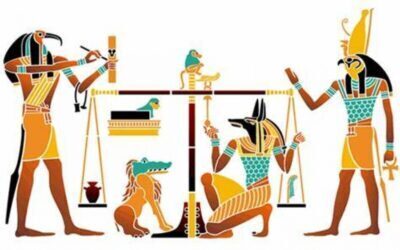December 17, 2024 Hidden history
In Egypt, the 42 commandments did not have a punitive function, but were seen as a way of living well and respecting others.
The 42 Egyptian Laws of Maat
The vast majority of people have certainly read (or at least heard of) the biblical story of Moses and the Ten Commandments.
But they have never heard of the 42 Egyptian Laws of Maat.
Maat was the Egyptian goddess responsible for preventing chaos and maintaining truth in ancient Kemet (Egypt).
In biblical history, Moses was brought up in “all the wisdom of the Egyptians” as recorded in Acts 7:22.
This means that Moses was well aware of the 42 Egyptian laws of Maat.
Perhaps Moses was inspired by the ancient Egyptian teachings when he wrote the commandments ?
The Egyptians followed the forty-two commandments of Maat, daughter of Ra, emblem of justice and truth.
Her symbols were the “scales” and especially the “feather,” emblems of cosmic order as opposed to barren chaos.
His nemesis was Isfet, the lie, chaos.
Maat was sent by Father to eliminate him.
Maat’s role was primary in the weighing of souls in the Duat, the Egyptian underworld.
His feather was the measure that determined whether or not the soul of the deceased would reach the afterlife.
The heart, the seat of each deceased’s soul according to the Egyptians, was weighed in the Hall of the Two Truths, or the Two Maats, on the plate of a scale guarded by Anubis.
On the other plate, the scale, the feather of the Maat was placed.
If its weight exceeded that of the feather, the soul could not reach the afterlife.
Therefore, the heart muscle was not removed from the corpse during mummification, unlike all other organs.
If the heart weighed the same as the Maat feather or less, it meant that the deceased had lived a virtuous life and would be taken to the Aaru Fields, a place of bliss with Osiris.
If it was heavier than a feather, the heart would be devoured by the monster Ammit, with no hope of immortality.

1. Do not kill or allow others to kill.
2. Do not betray your beloved or your spouse.
3. Do not live in anger.
4. Do not spread terror among people.
5. Do not assault or hurt your neighbor.
6. Do not exploit your neighbor or practice slavery.
7. Do not harm or cause pain to people or animals.
8. Do not cause tears to be shed.
9. Respect your neighbor.
10. Do not steal what is not yours.
11. Do not overeat.
12. Do not harm nature.
13. Do not deprive anyone of what he loves.
14. Do not bear false witness.
15. Do not lie to harm others.
16. Do not impose your ideas on others.
17. Do not act to harm others.
18. Don’t talk about other people’s facts.
19. Don’t secretly listen to other people’s facts.
20. Do not ignore truth and justice.
21. Do not misjudge people without knowing them.
22. Respect all sacred places.
23. Respect and help those in need.
24. Do not get angry without a good reason.
25. Never obstruct the flow of water.
26. Don’t waste water for your own use.
27. Do not pollute the earth.
28. Do not take the name of Neteru in vain.
29. Do not despise the beliefs of others.
30. Do not take advantage of another’s faith to do evil.
31. Do not address the gods too insistently or too lightly.
32. Do not take advantage of your neighbor’s possessions.
33. Honor the dead.
34. Keep holy days, even if you do not believe.
35. Do not appropriate the offerings made to the gods and use them for yourself.
36. Do not despise the sacred rites, even if you do not like them.
37. Do not kill animals without serious cause.
38. Do not act insolently.
39. Do not act arrogantly.
40. Do not boast of your wealth in front of others.
41. Respect these principles.
42. Respect the law when it does not conflict with these principles.














